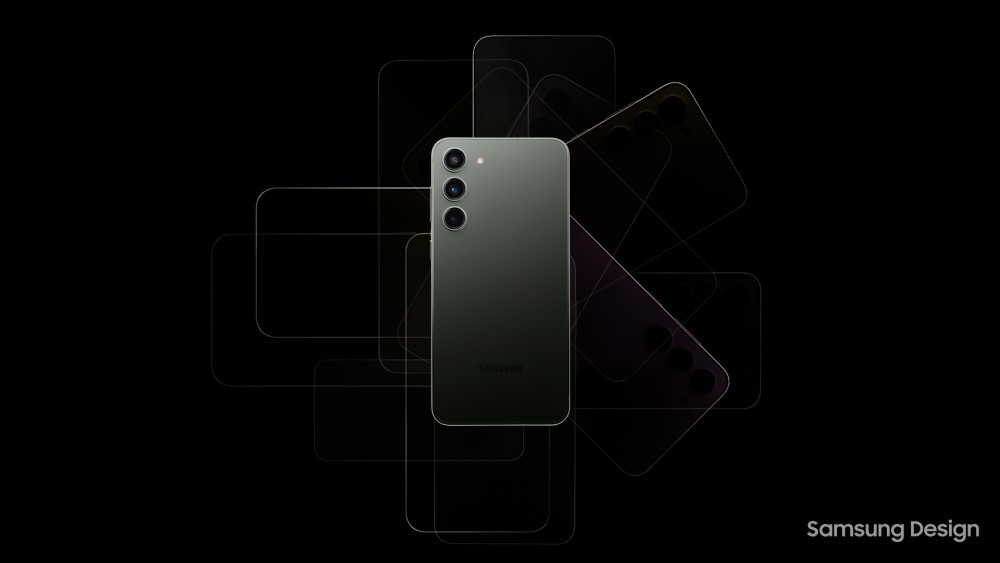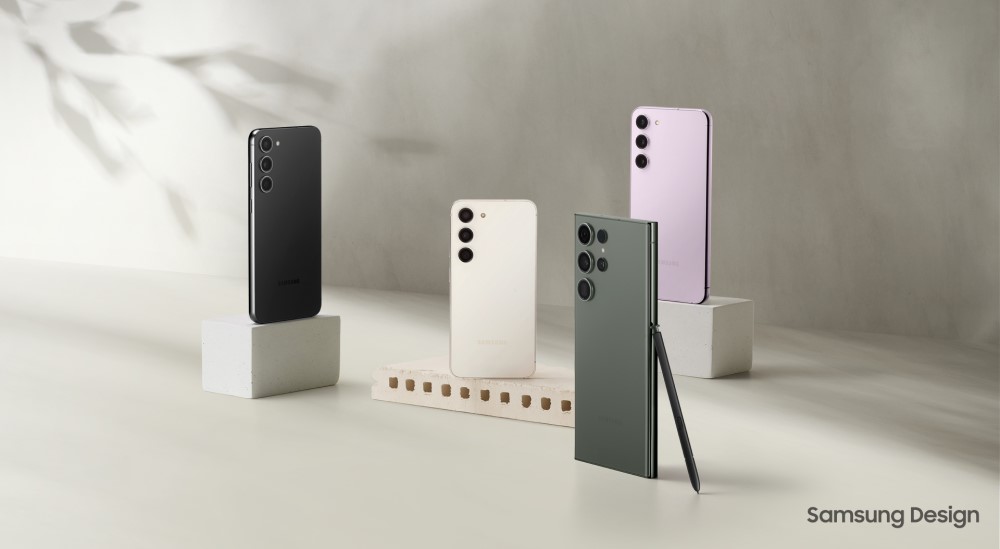Technology
[Design Story] Create the Essentials: Galaxy S23 Series

(Samsung Photo)
Samsung Electronics’ new Galaxy S23 series delivers an eco-conscious, premium smartphone experience to its users. By eliminating unnecessary elements and prioritizing quality, the Galaxy S23 series embodies those values Samsung itself also holds close, such as resource circulation for a better future for all.
Samsung Newsroom spoke with some of the Galaxy S23 series’ designers to learn more about how the new flagship range’s distinct design came about.
Premium Design With an Eco-Conscious Focus

Q. Please introduce the Galaxy S23 series’ design theme, “Create the Essentials”.
Our focus was on creating a design that boils down the essence of the smartphone. Resources can be wasted during the production process if too many unnecessary details are incorporated, so we made the decision to retain only the bare essential design features, based on the true identity of the device, for the basis of the Galaxy S23 series’ design.
Q: How is this theme in alignment with the general direction of the Samsung Galaxy design approach?
The Samsung Galaxy S series is a product lineup built on the true essence of what premium design can be. For the Galaxy S23 series, we deliberated extensively on what elements would not only make for a great design, but also how they would impact the world at large. Since we are living in a time where resource circulation and eco-conscious activities are at the forefront of daily life, we feel, too, that designers should reflect these values in their designs as the world over shifts its priorities towards eco-consciousness. Our design approach actively incorporates these ideas by making bold design decisions and incorporating future-forward ideas.
Q: What are the Galaxy design team’s goals towards creating designs that honor both people as well as the planet?
Our approach can be summarized in the form of five goals. Firstly, we aim to “create essence” through our designs for ultimate user satisfaction. Secondly, we want to “create circularity” to increase resource circulation efforts across the entire product lifecycle from manufacturing through to use and disposal. Thirdly, we aspire to “create standardization” in order to streamline our designs and subsequently reduce resource waste and manufacturing costs, and fourthly, to “create longevity” for our products by extending their life cycles and building easily fixable designs. Finally, we aim to “create transparency” through clear communication on the metrics of our design processes with a focus on eco-conscious activities. All Samsung Galaxy designers are guided by these five goals.
Q: Can you share more about how the design team is following through on these goals?
All projects we undertake keep the long-term vision in mind instead of short-term results, and we collaborate closely with the material sourcing teams to ensure our designs incorporate recycled materials. We also share our design strategy and plans with a range of internal stakeholders in order to further vitalize each project with different ideas and perspectives. We make sure to reflect on all the feedback we receive in order to keep eco-consciousness at front of mind when designing.
Q: How important is working with such an authentic mission in mind to the team?
We live in a world where the sharing of information is boundless, making temporary or short-term initiatives meaningless. We embrace the opportunity to think carefully about the values and efforts necessary required to accomplish our vision, as well as how best to communicate our approach transparently. This sense of mission as designers motivates us, and in time, we believe our customers, too, will come to understand and appreciate our determination.
The Samsung Galaxy Identity

Q: Can you share more about the two different designs, based on target audience, you developed for the Galaxy S23 series?
The Galaxy S23 and S23+ feature thin bezels that are slim and balanced on all sides for users to better focus on their screens, while a curved metal frame both protects the screen and provides the user with a comfortable grip. For the Galaxy S23 Ultra, we reduced the side edges and extended the flat surface of the device even further not only to provide better grip, but also to provide more space in which the S Pen can be utilized and ultimately maximize the benefits of the large screen for the user.
Our focus when designing was to convey a consistent design identity across all three devices through simple line design and planes that eliminate all unnecessary elements. Even the more subtle elements, such as the side keys, antenna slit, speaker hole and mic hole, had their size and layout meticulously adjusted to match this. Furthermore, the camera contour cut design seen on the Galaxy S22 and S22+ was removed, and all Galaxy S23 models are now fitted with a single camera design to provide even more consistency across the lineup.

Q: Would you agree that the Galaxy S23 series’ camera’s distinct design is as notable as its performance?
Since a lot of the smartphones currently on the market possess a similar shape, the camera design of a device has become a powerful way to distinguish a product and express brand identity. This is why the Samsung Galaxy S series’ camera layout has stayed the same since the Galaxy S21 series in order to foster a unique design identity.
The external part of the camera is a glossy metal while the internal parts have been processed with smooth hairlines in order to convey the camera’s powerful performance. The design of the inner elements of the camera, including the form, texture and color, were inspired by traditional camera lenses that minimize light reflection.
Future-Forward Color Swatches, Inspired by Nature

Q: Can you please introduce the main colors of the Galaxy S23 series?
Some of the Galaxy S23 series’ components were built using recycled materials1 to contribute to resource circulation, so in order to further reflect this idea of environmental protection, the Galaxy S23 series comes in four colors that are based on a concept we call “Shades of Nature”. The Green shade is reminiscent of a tranquil forest while Phantom Black embodies the silent strength of nature, and the bright Cream shade is warming to look at while Lavender captures the energetic nature of everyday life.

Four additional colors that we developed under the concept of “Shades in Dream” — Lime, Skyblue, Red and Graphite2 — will be exclusively available for devices purchased online. We wanted to provide online customers with some upbeat and futuristic shades that convey their brightness even when simply seen on-screen. The Lime shade, a brand-new addition to the Samsung Galaxy color lineup, has been designed to be a lively and captivating color swatch, and we hope our users will enjoy this new addition to the Samsung Galaxy color range.
Q: Can you speak more about the recycled materials used in part of the Galaxy S23 series’ back panel glass3?
Recycled materials based on plastic bottles can tend to have a yellowish tint to them, so we were initially worried that the coloring might end up too dark. However, after we processed the materials, we were surprised to find that this recycled material actually helped to create a more natural and organic look for the Cream shade.
Designed With the Planet in Mind

Q: Can you share more about the expansion of recycled materials involved in the Galaxy S23 series’ development?
The front and back glass panels of the Galaxy S23 series devices contain an average of 22% of pre-consumer recycled content, and the film that goes inside the back glass panel incorporates 80% of recycled plastics sourced from discarded plastic bottles. Furthermore, the inner components of the Galaxy S23 Ultra, including the S Pen cover and the lower speaker modules, have been built using recycled ocean-bound plastic sourced from discarded fishnets and plastic bottles, and aluminum byproducts from the manufacturing process were used for the S23 Ultra’s side and volume keys.
Furthermore, the packaging box is made from 100% recycled paper and the cover accessory also contains some recycled or biodegradable materials, meaning that all aspects of the Galaxy S23 series’ design reflect our commitment to the circulation of resources.
Q: What efforts have been made to create more eco-conscious packaging designs over the years?
We started to reduce the use of plastic in our packaging designs in 2018. When we first started, we had fourteen different packaging parts within a single package, and now for Galaxy S23 series, we have come a long way to ensure that only six packaging parts4 are included. We also made sure to leverage recycled paper materials when building the packaging box itself, and though paper materials made from 100% recycled pulp can be dusty and weaker than regular paper, we undertook extensive research, adjusted the manufacturing process and went through countless quality verification tests to find the perfect composition to use in our product packaging.
Q: What areas will you be focusing on for future package designs?
We will continue to focus on creating high-quality packaging that incorporates recycled paper materials. Our goal is to create our own paper materials made with pulp that we have developed ourselves, as well as to receive recognition for our eco-conscious designs.

Samsung is committed to pursuing innovation that does not take the planet’s resources for granted and that instead repurposes discarded materials in order to give them a second life, thus providing users with true, meaningful value. The Samsung Galaxy S series will continue to bridge the gap between usability and eco-consciousness through future-forward design choices.
Stay tuned to Samsung Newsroom for more on the all-new Galaxy S23 series.





















